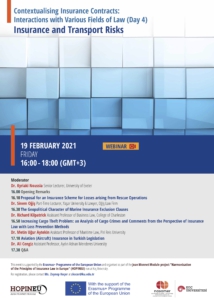Views
Nothing Found
Sorry, no posts matched your criteria
News
Prof. Lima Pinheiro’s “Last Class”
Luís de Lima Pinheiro, Professor of Law at the University of Lisbon, has given his so-called “Last Class” earlier this week, thus putting an end to his activity as a Professor at the graduate level in this Law School (while remaining active in post-graduate courses).
The online lecture, in Portuguese, is available here.
United Kingdom Supreme Court rules on a jurisdictional issue against Shell
In a landmark decision in the case of Okpabi and others v Royal Dutch Shell Plc and Another, the United Kingdom Supreme Court (“UKSC”) ruled on a jurisdictional issue on whether the claimants/appellants have an arguable case that the defendants/respondents – Royal Dutch Shell (an English domiciled company) – owed them a common law duty of care so as properly to found jurisdiction against a foreign subsidiary company (Shell Petroleum Development Corporation Limited, domiciled in Nigeria) as a necessary and proper party to the proceedings. This jurisdictional aspect was concerned with whether there was a real issue to be tried against the anchor defendant – Royal Dutch Shell (an English domiciled company).
The facts of the case was that the claimants/appellants, who are Nigerian citizens alleged that as a result of the negligence of Shell Petroleum Development Corporation Limited, numerous oil spills have occurred from oil pipelines and associated infrastructure operated in the vicinity of the claimants’/appellants’ communities. It is said that these oil spills have caused widespread environmental damage, including serious water and ground contamination, and have not been adequately cleaned up or remediated. It is also alleged that as a result of the spills, the natural water sources in the claimants’/appellants’ communities cannot safely be used for drinking, fishing, agricultural, washing or recreational purposes.
The High Court and Court of Appeal resolved this jurisdictional issue against the claimants/appellants, but the UKSC found merit in their appeal.
Analyses and comments on this decision are most welcome!



